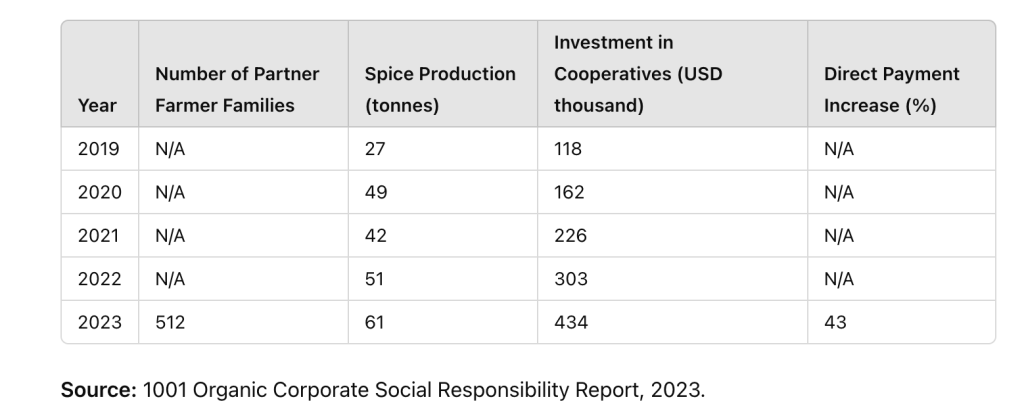Kilimokwanza.org Reporter
In 2023, Zanzibar-based spice company 1001 Organic achieved substantial growth and set new benchmarks for sustainability and community involvement. The company’s Corporate Social Responsibility (CSR) report for the year highlights a journey filled with impactful innovations, strategic expansions, and a steadfast commitment to the local and global community. Here’s a deeper look into how 1001 Organic redefines the spice trade through sustainability and empowerment.
Strategic Growth and Ecological Innovation
Under the leadership of Marcel Rupf and Raphael Flury, 1001 Organic underwent significant transformations in 2023. One of the key highlights was overhauling their packaging solutions and introducing a new line of recyclable materials for their 30-piece product assortment. This shift was not just about aesthetic improvement but was a critical step towards reducing the ecological footprint of their packaging, aligning with global sustainability goals.
Financial growth paralleled their environmental efforts. The company increased direct payments to its network of small farmers by 43%. This boost in farmers’ income was primarily fueled by the direct sales from their newly optimized web store, which also plays a critical role in pre-financing future harvests. This model ensures farmers have predictable income streams, empowering them to plan better and invest in sustainable agricultural practices.
Comprehensive Approach to Sustainability
1001 Organic’s sustainability efforts are deeply woven into every facet of their operations. As pioneers in organic spice production in Zanzibar, they champion regenerative farming methods, particularly agroforestry, to protect the island’s rich biodiversity and combat climate change. Their farming practices deliberately balance cultivation with conservation, using only 35% of the land for agriculture while preserving 65% as protected forests. This strategy supports spice quality and maintains ecological balance and soil fertility, crucial for long-term sustainability.
The company’s direct sourcing model ensures traceability and quality of spices, transparently serving both retail and wholesale sectors. This model is regularly validated through rigorous audits by external auditors, underscoring its commitment to maintaining high standards of production and ethical sourcing.
Economic and Social Impact
The expansion of 1001 Organic’s farmer network to 512 families in 2023 illustrates a successful scale-up of their business model grounded in trust, transparency, and fairness. This growth directly indicates their model’s effectiveness in fostering economic stability and promoting social change within local communities.
Investments in the community go beyond monetary benefits. Over the past five years, the company has injected approximately $1.2 million into local cooperatives, supporting the socioeconomic development of smallholder farmers. This funding has facilitated improvements in education, healthcare, housing, and transportation for the farmer communities, demonstrating a holistic approach to community support.
Leadership and Community Empowerment
Elizabeth Mwangi, the operations manager at 1001 Organic, symbolizes the company’s dedication to empowering women in significant roles. Responsible for overseeing procurement to distribution, Elizabeth’s leadership ensures operational efficiency and direct positive impacts on the farmers’ livelihoods. Her role is pivotal in maintaining fair trade practices, such as buying spices at prices above market value, which significantly enhances the quality of life for farmers and their families.
Future Outlook and Expansions
Looking ahead, 1001 Organic is committed to further expanding its influence by connecting more smallholder farmers to premium international markets and reducing inequalities within the supply chain. The company is exploring ways to move more value chain activities from Europe to Tanzania, aiming to boost Zanzibar’s economy directly.
1001 Organic’s journey through 2023 shows the power of integrating sustainability with business operations. By ensuring that their growth also enhances the livelihoods of their partner farmers and protects the environment, 1001 Organic sets a precedent for how modern businesses can achieve success while fostering a sustainable and equitable world. Their story is not just about spices but about cultivating a future where people, planet, and profit collectively thrive.
The data from the 1001 Organic Corporate Social Responsibility (CSR) Report for 2023 highlights several important trends and implications for the company and its stakeholders:
- Growth in Partner Farmer Families: The increase to 512 partner farmer families in 2023 suggests successful expansion of 1001 Organic’s network. This growth indicates the company’s effective outreach and support programs, enhancing its supply chain resilience and capacity to meet demand.
- Increase in Spice Production: The steady increase in spice production, reaching 61 tonnes in 2023, reflects enhanced agricultural productivity and operational efficiency. It demonstrates the scalability of 1001 Organic’s business model and its ability to capitalize on the growing market for organic spices.
- Rise in Investments in Cooperatives: The significant increase in investments in cooperatives, culminating in $434,000 in 2023, underscores 1001 Organic’s commitment to community development and sustainability. These investments likely support infrastructure, education, and health initiatives, contributing to the overall well-being and professional development of the partner farmers.
- Direct Payment Increase to Farmers: The 43% increase in direct payments to farmers in 2023 illustrates a strong commitment to fair trade practices. By enhancing the financial stability of farmers, 1001 Organic is ensuring a more sustainable supply chain, motivated workforce, and high-quality product output.
